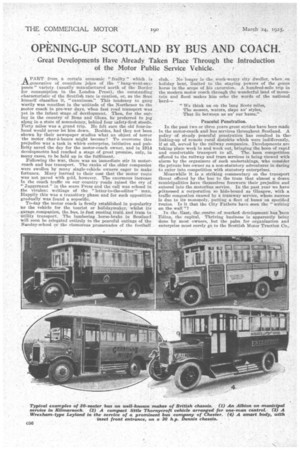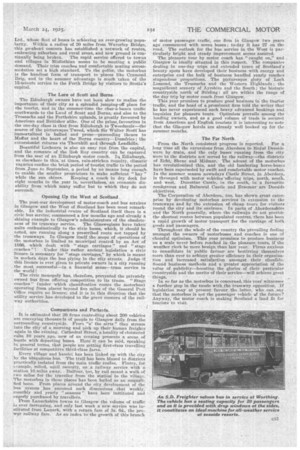OPENING-UP SCOTLAND BY BUS AND COACH.
Page 40

Page 41

If you've noticed an error in this article please click here to report it so we can fix it.
Great Developments Have Already Taken Place Through the Introduction of the Motor Public Service Vehicle.
APART from, a certain economic " frailty " which is .generative of countless jokes of the " bang-went-saxpence " variety (usually manufactured north of the Border for consumption in the London Press), the outstanding characteristic of the Scottish race is caution, or, as the Scot himself classifies it, "canniness." This tendency to gang warily was manifest in the attitude of the Northener to the motor coach in pre-war days, when fast road transport was yet. in the infant stage of development. Then, for the outing in the country of Bens and Glens, he preferred to jog along in a state Of somnolency, behind four safety-first steeds. Forty miles was a grand trip. He felt sure the old four-inhand would never let him down. Besides, had they not been shown by their newspaper studies what an object of terror the motor char-a-banes might become? To overcome this prejudice was a task in which enterprise, initiative and publicity saved the day for the motor-coach owner, and in 1914 developments had reached a stage of great promise, only, in many cases, to be held up in the fulfilment.
Following the war, there was an immediate stir in motorcoach and bus transport. The ranks of the older companies were swollen by many single-vehicle owners eager to make fortunes. Many learned to their cost that the motor route was not paved with gold, however. The enormous increase In the coach traffic on our country roads raised the cry of " Juggernaut " in the scare Press and the call was echoed in the virulent writings of the "letter-to-the-editor " man. Happily this was a transitory phase and for such opposition gradually : was found a soporific.
To-day the motor coach is firmly 'established in popularity hathe vehicle for the tourist or holidaymaker, whilst its garage.corapauion, the bus, is fast .ousting, train, and tram in utility transport. The lumbering horse-brake in Scotland. will soon be relegated entirely to the peaceful outings of the Sunday-school or the clamorous promenades of the football club. No longer is the work-weary city dweller, when on holiday bent, limited to the staying powers of the genus horse in the scope of his excursion. A hundred-mile trip in the modern motor coach through the wonderful land of mountain and flood makes him echo the words of the national
bard " We think na on the lang Scots miles, The mosses, waters, slaps an' styles, That lie between us an' our 'bares."
Peaceful Penetration.
In the past two or three years great strides have been made in the motor-coach and bus services throughout Scotland. A policy of steady peaceful penetration has resulted in thelinking-up of remote rural districts which were indifferently, If at all, served by the railway companies. Developments are taking place week in and week out, bringing the boon of rapid and comfortable transport to all. The. keen competition -offered to the railway and tram services is being viewed with alarm by the organizers of such undertakings, who consider the private bus owner as a non-statutory adventurer in daring to cuter into competition with statutory enterprises.
Meanwhile it is a striking commentary on the transport threat offered by the bus to the tram that almost a dozen municipalities have themselves forsworn their prejudice and entered into the motorbus service. In the past year we have xitnemed a corporation so hide-bound as Glasgow, with a traffic congestion caused by a tramway service, whose success is due to its monopoly, putting a fleet of buses on specified routes. Is it that the City Fathers have seen the " writing on the wall "?
In the .East4 -the .centre -of marked. .development has 'been Edina, the capital. Thriving business is apparently being done by most owners, but the palm for organization and enterprise must surely go to the Scottish Motor Traction CO., Ltd., whose fleet of buses is achieving an ever-growing popularity. Within a radius of 20 miles from Waverley Bridge, this go-ahead concern has established a network of routes, embracing suburban and rural areas, and new ground is continually being broken. The rapid service offered to towns and villages in Midlothian seems to be meeting a public demand. Their trim coaches and comfortable seating accommodation set a high standard. To the golfer, the Motorbus is the handiest form of transport to places like Cramond Brig, and in the summer advantage is much taken of the 15-minute service to the Forth Bridge by visitors to Scotia's capital.
The Lure of Scott and Burns.
The Edinburgh owners have not been slow to realize the importance of their city as a splendid jumping-off place for the tourist, and in the summer-time the 'char-a-banes traffic southwards to the Land of Scott and Burns, and also to the Trossachs and the Perthshire uplands, is greatly favoured by American and Britisher alike. One of the prime, favourites in the one-day class is that from Edinburgh to Tweedmuir—the source of the picturesque Tweed, which Sir Walter Scott has immortalized in ballad and prose—proceeding thence to Moffat and the heart of the Burns country---Dumfries; the excursionist returns via Thornhill and through Leadhills.
Beautiful Lochearn is also an easy run from the capital, and the romance of the Rob Roy country can be captured from the seat of an Edinburgh Motor coach. In. Edinburgh, as elsewhere in this, at times, rain-stricken country, climatic vagaries confine the brisk period of tourist traffic to the period from June to September, a period by no means long enough to enable the smaller proprietors to make sufficient " hay " while the sun shines. Keeping a coach in dry dock for eight months in the year is, nevertheless, an economic disability from which many suffer but to which they do not succumb.
Opening Up the West of Scotland
The post-war development of motor-coach and bus services in Glasgow and the West of Scotland has been most remarkable. In the industrial centre of Scotland itself there is a civic bus service; commenced a few months ago and already a shining example to Glasgow's administrators of the obsoleteness of its tramway service. The Glaswegians have taken" quite enthusiastically to the civic buses, which, it should be noted, are running along a prescribed route not tapped by the tramways. In Glasgow itself the scope of operations of the motorbus is limited to municipal contrell by an Act of 1566, which dealt with "stage carriages !' and "stage
cc-aches "1 Under this rather ancient legislation a civic licence is necessary for "stage carriages," by which is meant in modern days the bus plying in the city streets. Judge if this licence is ever given to private owners in a city, running the most successful—in a financial sense—tram service in the world !
The civic monopoly has, therefore, prevented the privately owned bus from offering competition to its trams. "Stage coaches" (under which classification comes the motorbus) operating from placesbeyond five miles of the General Poet Office require no licence, and it is in this direction that the utility service has-developed to the grave concern of the railway authorities.
Comparisons and Portents.
It is eStimated that 20 firms controlling about 200 vehicles are conveying thousands of people to Glasgow daily from the surrounding countryside. Frors "a' the airts " they stream 'Into the pity' of a morning and pick up their human freights again in the evening. Cathedral Street, a locality of cloistered calm 10 years _ago, now of an evening presents a scene of bustle with departing buses. Here. it can be said, speaking in general terms, that people are getting first-class travelling facilities at competitive third-class fares.
. Every village and hamlet has been linked up with the city by the ubiquitous bus. The trail has been blazed to districts practically isolated from the main traffic smiles. Fintry, for essimple, relied, until recently, on a railway service with a station 10 miles away. Balfour, too, by rail meant a walk of two miles for the traveller from the statioii to the village.. The motorbus in these places has been hailed as an unqualified boon. From places around the city development of the bus system has assumed such dimensions that weekly, monthly and yearly "seasons have been inAtituted and eagerly purchased by travellers.
Prom Lanarkshire towns to Glasgow the volume of traffic is ever increasing, and only last week anew service was instituted from Lanark, with a return fare of 3s. 6d., the prewar railway fare. As an index to the growth of this branch of motor passenger traffic, one firm in Glasgow two years ago commenced with seven buses; to-day it has 27 on the road. The outlook for the bus service in the West is particularly bright and steady improvement seems assured.
The pleasure tour by motor coach has "caught on," and Glasgow is ideally situated in this respect. The companies dealing in one-day trips and extended tours of Scotland's beauty spots have developed their business with energy and enterprise end the bulk of business handled yearly reaches stupendous proportions. The picturesque glory of Loch Lomond, the Trossachs and the Western Highlands ; the magnificent scenery of Ayrshire and the South ; the historic countryside north of Stirling: all are within the range of the day trip by motor coach from Glasgow.
This year promises to produce good business in the tourist traffic, and the head of a prominent firm told the writer that he has never experienced such heavy advanced bookings and inquiries for pleasure tours. Optimism prevails among the leading owners, and as a good volume of trade is secured from American and English tourists it is interesting to note that the Glasgow hotels are already well booked up for the summer months.
The Far North.
-From the North consistent progress is reported. For a long time all the excursions from Aberdeen to Rofal Deeside were by train, and the only buses running from the city were to the districts not served by the railway—the districts of Edit, Shine and Midmar. The advent of the motorbus has revolutionized this, and the old lumbering horse-buses have been superseded by swift and comfortable motor coaches. In the summer season nowadays Castle Street, in Aberdeen, is thronged with motor vehicles 'offering trips, north, south, and west. Dunottar Castle, in the south, in a favourite rendezvous and Balmoral Castle and Braemar are Deesisle objectives.
The Corporation of Aberdeen, too, has shown great enterprise by developing motorbus services in extension tothe tramways and by the extension of cheap tours for visitors round the city and its environs. In parts. of Aberdeenshire and the North generally, where the railways do not provide the shortest routes between populated centres, there has been a rapid growth of motor transport for the carriage of both goods and passengers.
Throughout the whole of the country the prevailing feeling amongst the owners of motorbuses and coaches is one of
cheerful optimism. This year promises to produce business on a scale never before reached in the pleasure tours, if the weather clerk be more benign, than last year. Firms anxious to consolidate in public favourarebestirring themselves more than ever to achieve greater efficiency in their organizetien and increased satisfaction amongst their clienrele. Sound business methods and a greater appreciation 'of the value of publicity—boostirig the glories of their particular countryside and the merits of their service—will achieve great things. Inung sr further r things. Inung sr further r
far as the motorbus is concerned, this year witnesses step in the tussle with the tramway opposition. If legislation may at presentfavour the latter, who can say that the motorbus is not the passenger vehicle af the future? Anyway, the motor coach is Making Scotland a land fit for tourists to visit.
























































